
views
A string of organizational flaws during the visit of Pope Francis to Brazil that put him at risk and stranded thousands of visiting faithful has deepened concern about the country's ability to host the upcoming World Cup and Olympic Games.
Even Rio de Janeiro's mayor gave himself a failing grade in organizing World Youth Day, a biennial gathering of young Catholics that on Sunday drew some 3 million people to a seaside mass delivered by the pope on Copacabana beach.
The city, said Eduardo Paes in a radio interview on Friday, "scored closer to zero than ten."
The big events in Brazil, including 2014 World Cup soccer tournament and the 2016 Olympic Games, are supposed to showcase a decade of economic growth in Latin America's largest country and justify the first-world airs put on by many of its leaders.
But slowing growth in the last two years and disgust with corruption, rising prices and the sad state of public services are leading many Brazilians to see little more than pretense behind the extravaganzas.
In June 2013, protesters staged massive demonstrations across Brazil during the Confederations Cup, a soccer competition seen as a trial run for the World Cup. Anger focused on the fact that billions of dollars was being spent on sporting events rather than on schools, hospitals and public transport.
Even as Brazilians gave Francis a rapturous reception, they were taken aback by the problems that emerged during his visit and the youth summit, an event which had been planned for two years. Catholic faithful who came from across the world faced long lines, crowded buses, faulty trains and disorganization.
"Only the pope can save this," ran the headline at the top of O Globo, Rio's biggest newspaper, on Saturday.
Francis had gracefully brushed off the problems. They included a security scare early in his stay, transport delays that stopped thousands from getting to some appearances and the last-minute decision to move the youth conference's climax to Copacabana from a flood-prone field that had been turned into a bog by heavy rain.
Security and transportation experts said the problems stemmed from the strain added to bureaucracies, infrastructure, and public services that are buckling even at the best of times.
Heavy traffic and bad weather routinely cause gridlock in Rio, a city that depends on tunnels and bridges to connect sprawling communities scattered between mountains, marshes and beaches.
The chaos surrounding the Catholic youth gathering prompted serious questions about whether authorities will be able to handle alcohol-fueled soccer fans at the World Cup or the logistical challenge of moving the throngs of athletes and fans for Olympic competitions.
"There is never a way to control absolutely everything when you get that many people together," said Christopher Gaffney, a professor of urbanism at Rio's Fluminense Federal University, who has studied the organization of major events elsewhere. "The focus has to be on minimizing the chances that things go wrong."
During the pope's visit to Rio, authorities sought to ease the strain by declaring public holidays and cordoning off huge sections of the city, lessening traffic for anything other than pope-related activities.
The holidays, also planned during the big upcoming sports events, have been criticized by some who accuse the city of shutting down much of the local economy for the benefit of the handful of interests involved in the events.
Even with holidays, plenty went wrong during the last week.
On Monday, as Francis traveled into the city center from the airport, his driver turned into an unprotected lane along a major avenue, where adoring crowds surrounded his vehicle and reached in through the window to touch him.
Though the pope himself appeared to enjoy it, staff and security were horrified, perhaps recalling the shooting of Pope John Paul as he rode in his open vehicle in St Peter's Square in the Vatican in 1981.
On Tuesday, a malfunction in the Rio metro left some subway stations out of service for more than two hours. The shutdown caused many visitors to miss an inaugural mass.
In midweek, as rains pounded Guaratiba, the distant suburb where a giant altar had been erected in a muddy pasture, Mayor Paes said there were no plans to change the venue. On Thursday organizers changed course, recognizing that the mud and rain could cause health problems and even accidents for the legions that would have to travel there.
However prudent the decision, it disrupted the plans of hundreds of thousands of people. Critics said it could have been avoided if organizers had picked a more suitable location to begin with. Locals who had invested heavily in concessions for the hordes of visiting worshippers were left in the lurch.
Officials in Rio had helped sell the city for big events by pointing to a long history of the annual Carnival and New Year's celebrations, which both attract more than a million revelers to its streets. Local authorities now acknowledge they face a learning curve in staging the international gatherings.
"We have had two big events in a row and we have learned from both," said Jose Monteiro, head of the state's office for security at large events. Looking ahead toward the World Cup and Olympics, he promised, "we are doing our homework."
Ian Nanke, an Australian who attended World Youth Day in Sydney in 2008, had struggled to find a place to sleep on Saturday on Copacabana. Back home, he recalled, pilgrims were guided toward specific areas and transport was more efficient.
"It's hard to get there on time," he said. "Call it organized chaos."
















Comments
0 comment